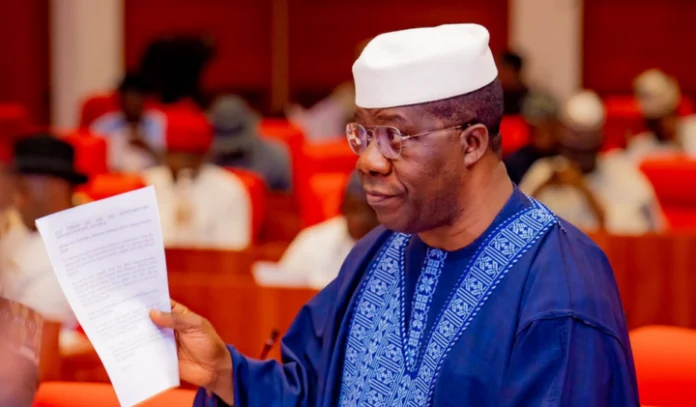The Senate Majority Leader, Senator Opeyemi Bamidele, has reaffirmed that the tax reform bills currently under consideration by the upper chamber remain active and have never been suspended. In a detailed statement released to THISDAY, summarizing his remarks on the Senate floor, Bamidele emphasized that at no point had the legislative process concerning these bills been halted, nor was there ever a suggestion to withdraw them from deliberation.
Senate Confirms Special Meeting on Tax Reform
The Senate, as part of its continuing focus on the tax reform bills, convened a critical meeting in Abuja between its special committee on tax reform, led by Minority Leader Abba Moro, and representatives from the Office of the Attorney General of the Federation (AGF) and Minister of Justice, Lateef Fagbemi, SAN. The meeting represents a concerted effort to address concerns and foster consensus on the proposed legislation.
In a related development, the Senate announced a reshuffling within its ranks, removing the Chief Whip, Senator Tahir Monguno, from the ad hoc committee on tax reform. His position was filled by Senator Kaka Shehu of Borno Central, reflecting a strategic move to optimize the committee’s effectiveness.
Controversy and Politicization
The tax reform bills have been the subject of heated debate, drawing both commendation and criticism. Addressing concerns during an interview with ARISE NEWS, Senator Abba Moro highlighted the increasing politicization of the legislative process. Moro expressed alarm over the distortion of facts and the framing of the debate as a regional or political contest rather than a national discourse focused on economic stability and growth.
He called for a more objective examination of the bills, urging stakeholders to prioritize the national interest. A significant area of contention involves proposed amendments to the Value Added Tax (VAT) distribution formula. Critics argue that the shift towards a derivation-based model could disproportionately affect less economically active states, especially in northern regions.
Moro countered these criticisms by noting that the current VAT system—grounded in equity, equality, and population—was designed to ensure fairness. He acknowledged the concerns but urged further advocacy and education to help stakeholders understand the intended benefits of the reforms.
Senate Leadership and South-South Senators’ Confidence Vote
Meanwhile, senators from the South-South geopolitical zone passed a unanimous vote of confidence in Senate President Godswill Akpabio. In a communique signed by Senator Seriake Dickson, the group reaffirmed its support for Akpabio’s leadership and the tax reform initiatives, emphasizing their importance for national development.
The senators commended the proposed reforms, asserting that they would enhance revenue generation and foster economic stability. They pledged to work collaboratively with the Senate leadership to ensure the bills are passed in a form that aligns with the collective aspirations of Nigerians.
Clarifying Legislative Processes
Senator Bamidele took the opportunity to dispel misconceptions about the status of the tax reform bills. In his remarks, he invoked Senate Rule 42 and Sections 60 and 62 (1–4) of the 1999 Constitution (as amended) to underscore that the bills remain under active consideration.
“Nowhere in our votes and proceedings was it stipulated that deliberations on the Tax Reform Bills, 2024, had been suspended or withdrawn,” Bamidele stated, adding that the upper chamber was merely engaging in standard legislative procedures to address concerns.
He reiterated that the tax reform bills are executive communications originating from the Federal Executive Council (FEC) and transmitted by the President’s office. “These are not private member bills,” he clarified. “Only the executive arm of government has the authority to withdraw them.”
Bamidele expressed dismay over the misrepresentation of the Senate’s actions, which he attributed to misinformation in some media reports. He criticized attempts to pressure or intimidate the legislature, stating that such actions were undemocratic.
“The Senate cannot and will not be bullied into adopting procedures inconsistent with its established rules,” he declared. “Our commitment is to the Nigerian people, and we will continue to deliberate, consult, and ensure that every stakeholder’s voice is heard in shaping these critical reforms.”
Setting the Record Straight
Bamidele addressed claims made during Wednesday’s plenary session, where Deputy Senate President Jubrin Barau reportedly instructed the Finance Committee to halt its six-week legislative review of the bills. Countering this, Bamidele stated that no such directive was issued.
“Our mandate was clear: conduct public hearings and submit a report within six weeks,” Bamidele explained. He pointed out that the creation of the ad hoc committee, chaired by Senator Moro, was an additional measure to facilitate discussions with key stakeholders, including the AGF and other executive officials.
He emphasized that the Senate’s actions reflected a transparent and inclusive approach to lawmaking. “This is where we deliberate, legislate, and represent the interests of the Nigerian people,” Bamidele said. “We will not be distracted by external influences or unfounded narratives.”
Senate President’s Remarks
Senate President Akpabio also weighed in, praising Bamidele for his clarifications. He urged any dissatisfied parties, including state governors, to participate in the forthcoming public hearings rather than resort to external lobbying or media campaigns.
“We are doing our work in the best interest of Nigerians,” Akpabio asserted. “The tax reform bills are alive, and further legislative actions are ongoing to ensure they address the country’s economic challenges effectively.”
Akpabio also stressed the importance of separating legislative deliberations from external pressures, cautioning against the undue politicization of the process.
Conclusion
As deliberations continue, the Senate remains committed to fostering dialogue and addressing concerns surrounding the tax reform bills. The leadership has called on all stakeholders, from civil society to state governors, to engage constructively in the legislative process to ensure that the reforms benefit all Nigerians.
By maintaining an open and transparent process, the Senate aims to pass tax reform legislation that aligns with the nation’s economic aspirations while addressing stakeholder concerns comprehensively.

